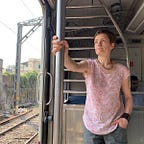New Wave of Feminism
An Opportunity for Personal and Community Growth
When I was twelve I organized a Save the Earth Committee with my female friends. One weekend we set out to clean litter out of our town brook. My mom, who used to wear t-shirts that read Women Power: It’s Much Too Good to Waste and A Woman Needs a Man Like a Fish Needs a Bicycle, dropped us off with two trash barrels. We waded into the brook, mucky water overflowed our rainboots as we fished handful after handful of Capri Sun juice pouches, aluminum and polyethylene Bugles bags, and brown beer bottles out from under fallen tree branches and matted oak and maple leaves. We were crusaders who would clean this water until it ran clear and free from debris.
An older woman perched on the hill behind her house called down to us. I waved back proud of our barrel full of trash. She asked what we were doing and scowled when I told her.
“That’s boys’ work,” she scolded.
She suggested we recruit a few boys to get dirty and lift the trash barrels for us. She was messing with the wrong girl. I informed her we were just as strong and equipped as the boys, in fact we were doing it. We hadn’t discriminated against boys helping with the project but none had volunteered. My face flared red as I yelled back up the hill to her. I felt indignant, shamed by her look of disapproval, and determined to finish our job.
That was the moment when I realized my mom’s faded t-shirts weren’t really outdated at all, inequity in the workplace was probably still real, women who stayed home to raise kids and had no work to return to were disadvantaged after we grew up and moved away, and I would constantly need to prove my strength not just to boys and men but also to women like that one who’d become complacent in her role.
Fast forward a couple decades and I’m raising a child of my own. My fear of raising a white male made way for a new depth of feminism, embracing the responsibility of teaching my son about his unearned privilege and how to be an accomplice while nurturing him as an individual.
Recently, I’ve been one of those white women who’s used Kimberle Crenshaw’s term intersectionality too liberally. I spend a lot of time thinking about systems of oppression. I also think a lot about how each of our individual experiences impact our lives and behavior in society. I think about shared and diverging experiences of race, class, ability, gender, sexuality, occupation, carceration, citizenship, religion, family, health, and any number of factors that bring us together and set us apart. I’m working on how to pivot my activism to become a better accomplice to women of color. I’m investigating what putting anti-racism to the forefront looks like.
I’m looking for an organization committed to fourth wave feminism, conscious of white privilege, and without dismissing the movements that came before us. By centering the voices and needs of women of color, immigrants, LGBTQ people, those who are currently and formerly incarcerated, girls, women, trans, and gender nonconforming people who’ve experienced foster care, and low-income women and families we bring rise to those who are marginalized but not silenced in our society.
By being transparent about the ways we want to grow as individuals, organizations, and communities we offer a starting point to work together towards true equity.
